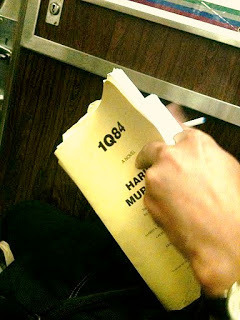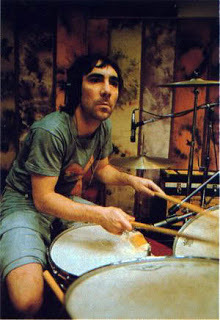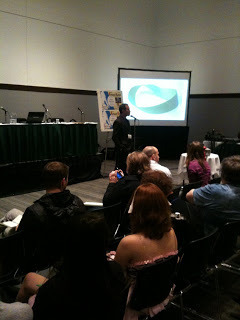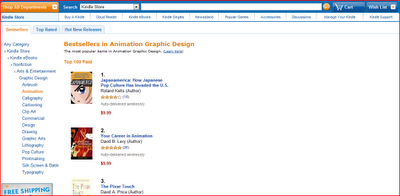Roland Kelts's Blog, page 66
October 3, 2011
Haruki Murakami's Nobel odds spike
According to
The Atlantic Wire
:
"For what it's worth, the English betting public seems to think Japanese novelist
Haruki Murakami is capable of pulling an upset. Last Tuesday, betting firm
Ladbrokes put the odds of a Murakami win at 16-to-1. That number has since
shortened to 8-to-1. (Syrian poet Adonis remains the odds-on favorite at
4-to-1, followed by 80 year-old Swedish poet Tomas Transtromer, whose odds have
gone from 9-to-2 to 6-to-1.)"
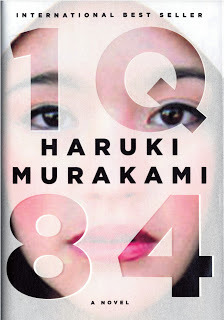
"Pulling an upset?" Is H in the playoffs?
"For what it's worth, the English betting public seems to think Japanese novelist
Haruki Murakami is capable of pulling an upset. Last Tuesday, betting firm
Ladbrokes put the odds of a Murakami win at 16-to-1. That number has since
shortened to 8-to-1. (Syrian poet Adonis remains the odds-on favorite at
4-to-1, followed by 80 year-old Swedish poet Tomas Transtromer, whose odds have
gone from 9-to-2 to 6-to-1.)"

"Pulling an upset?" Is H in the playoffs?
Published on October 03, 2011 16:24
Japanamerica @NYAF Oct. 13-16 w/Makoto Shinkai
On board for the 2011 New York Anime Festival / Comic Con, October 13-16. I am honored to be conducting a taidan, or live onstage conversation/interview, with anime auteur Makoto Shinkai (5 Cm Per Second, Children Who Chase Lost Voices ...) on Saturday. I will also be participating in assorted book signings/meet & greets. Details forthcoming.
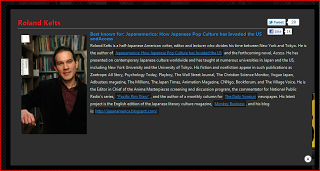
If you're in town and near the Javits Center, please join us and say hello -- or even just 'hi.'

If you're in town and near the Javits Center, please join us and say hello -- or even just 'hi.'
Published on October 03, 2011 15:00
October 2, 2011
Trevor
Published on October 02, 2011 22:51
September 28, 2011
1Q84 by haruki murakami
Published on September 28, 2011 15:43
September 15, 2011
On Donald Richie's latest, "Viewed Sideways"

It's almost impossible for the English-language reader with more than a momentary interest in Japan to avoid Donald Richie.
You may find him in print through his copious newspaper columns and reviews, his several wide-ranging books on Japan, assaying subjects as seemingly disparate as film, gardens, Zen and the Inland Sea, or his forays into fiction.
If you live or stay in Tokyo for a stretch, you may also find him in the flesh. Last time I checked, the 87-year-old Richie was still very much a man-about-town, appearing frequently to give readings and talks at foreigner-friendly venues in the heart of the city.
Little wonder: Richie has been living in Tokyo since the late 1940s and writing about Japan for nearly as long. You'd be hard-pressed to find an expat writer in Japan with greater seniority.
Fuzziness encroaching?
But seniority takes its toll, of course, and not just physically.
When I attended one of Richie's Tokyo readings from his last major publication, "The Japan Journals: 1947-2004," I couldn't ignore an unnerving discrepancy: the prose in his more recent entries lacked the force, clarity and sheer frisson of his earlier writing, as if the Japan of the now had somehow wilted for him, grown fuzzy and indistinct.
At the time, I was about to publish my own book, "Japanamerica," about the abundant color and creativity in contemporary Japan and the enthusiasm it had triggered in the West.
Were we living in the same country? Or was I, as a much younger expat writer, simply more sensitive to and excited by what I was seeing?
Richie nearly answers the latter question in a 2003 interview for the Japan cinephile website, "Midnight Eye."
"I think in any country if you're an expatriate, the first five to 10 years are the most exciting," he writes. "This is when you are learning the most, and when you're most open to things that are new and are putting things together."
Read more: Seen from afar: An outside view of the 'real' Japan | CNNGo.com http://www.cnngo.com/tokyo/visit/seen-afar-outside-view-real-japan-482277#ixzz1Y5j1Inji
Published on September 15, 2011 22:45
September 7, 2011
Monkey Business takes Canada! 9/9, 12, 13
Please join us in Toronto :
Japanese and Canadian Writers:
The Canadian launch of
Monkey Business: New Writing from Japan
International Edition (English language)
Friday, 9 September 2011 6:30 p.m.
at The Japan Foundation, Toronto
Two wide-ranging dialogues celebrating the launch of the English edition of the Japanese literary magazine, Monkey Business International. Featured will be novelists Hiromi Kawakami and Eric McCormack and poets Minoru Ozawa and Rob Winger. The event will be conducted in English and Japanese (with English Interpretation)
Location: The Japan Foundation, Toronto
Address: 131 Bloor Street West, 2nd floor of the Colonnade
416.966.1600
Admission: Free
RSVP: www.jftor.org/whatson/rsvp.php or (416) 966-1600 x103
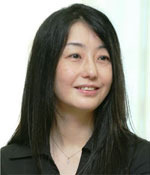 Hiromi Kawakami
Hiromi KawakamiHiromi Kawakami has written nine novels and several short story collections. She won the prestigious Akutagawa Prize in 1996 for Hebi wo Fumu (Tread on a Snake); in 2000 she won the Ito Sei Literature Prize and the Woman Writer's Prize for Oboreru (Drowning); and in 2001 she won the Tanizaki Prize for Sensei no Kaban (The Briefcase), which is being translated by Allison Powell and will be published by Counterpoint Press in 2012. Michael Emmerich's translation of her novel Manazuru was published by Counterpoint in 2010. She writes the serial People from My Neighborhood, a collection of vignettes, for Monkey Business, a part of which appeared in the first English issue of Monkey Business.
 Eric McCormack
Eric McCormackEric McCormack came from Scotland to Canada in 1966 and taught literature at St. Jerome's University, Waterloo till his retirement in 2004. His books have been published in a number of languages, most recently Russian and Chinese. His first novel, The Paradise Motel (1989) won the Scottish Council Book Prize. Other works have been short listed for various awards: a story collection, Inspecting the Vaults (Commonwealth Writers Prize, 1987); the novels, First Blast of the Trumpet Against the Monstrous Regiment of Women(Governor General's Award, 1997) and The Dutch Wife (City of Toronto Book Award, 2002). His stories have been included in such anthologies as The Oxford Book of Canadian Ghost Stories and The Oxford Book of Scottish Short Stories.
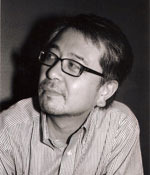 Minoru Ozawa
Minoru OzawaMinoru Ozawa is a leading haiku poet, and edits the highly regarded haiku journal Sawa. He won the Haiku Poet Association New Poet Award with his second collection Ryuuzou (Statue) in 1998; his 2005 collection Shunkan(The Moment) was awarded the Yomiuri Prize for Literature; and Haiku no Hajimaru Basho (Where the Haiku Begins), a book-length essay on the art of haiku, won the Haiku Poet Association Criticism Award. He teaches at Atomi Gakuen Women's University and Waseda University . His haiku on monkeys appeared in the first English issue of Monkey Business.Photo by Masahiro Tanaka
 Rob Winger
Rob WingerRob Winger grew up country in small-town Ontario. His first book,Muybridge's Horse, was named a Globe and Mail Best Book for 2007, and was shortlisted for the Governor General's Award, Ottawa Book Award and Trillium Book Award for Poetry. An active editor and teacher, Rob completed his PhD in literature and cultural studies while writing his second collection, The Chimney Stone (2010), a book of ghazals. Rob and his family live in the hills northeast of Toronto.
Photo by Kristal Davis
The aforementioned event is part of a series of events organized by the Japan Foundation, in cooperation with other institutions, with the goal of promoting dialogue through literature between Canada and Japan.
Other related events:
Japanese Literature Today
Readings (in Japanese and with English translation) and commentary by four of Japan’s leading literary figures including; haiku poet Minoru Ozawa; novelists Hiromi Kawakami and Hideo Furukawa, and translator/essayist Motoyuki Shibata. For more information, visit www.yorku.ca/ycar or email ycar@yorku.ca.
Monday, 12 September 2011 | 12:30 to 2:30pm | Harry Crowe Room | 109 Atkinson | York University
The Translator and the Novelist: Japanese Literature After Fukushima
A dialogue between noted translator Motoyuki Shibata and Hideo Furukawa, one of Japan’s hottest young novelists. Novelist Hiromi Kawakami and haiku master Minoru Ozawa wi ll provide further comments. For more information, visit www.jccc.on.ca/ or email jccc@jccc.on.ca.
Tuesday, 13 September 2011 | 7pm | Japanese Canadian Cultural Centre | 6 Garamond Court | Toronto
Tickets $10 for JCCC Members, $12 for non-members +HST
Published on September 07, 2011 10:06
September 6, 2011
Keith
Published on September 06, 2011 23:13
anime boston
Published on September 06, 2011 23:10
From Asia to the world
Writer Jenny Uechi on the growing global popularity of Asian Pop Culture (online @TheGeorgiaStraight):
Popular culture moves from east to west
 Comments (2)
Comments (2) 

By Jenny Uechi, September 1, 2011

Taiwanese actor Jay Chou is just one of the many East Asian stars making a big splash in the western world.
Special coverage
Telus TaiwanFest 2011
It isn't mainstream yet, but East Asia seems to be slowly nipping at the heels of the U.S. as the world's cultural epicentre. Signs of change are subtle, but everywhere: giant Korean Hangul letters in "Check It Out", a Nicki Minaj music video (the rapper also occasionally calls herself "Harajuku Barbie" in reference to a Tokyo fashion district); Taiwanese singer Jay Chou starring opposite Seth Rogan in The Green Hornet; and Japanese pop star Gackt teaming up with Josh Hartnett in the Hollywood action movie Bunraku, which will be released in Canadian theatres in September. A generation ago, East Asian consumers were looking to the U.S. and Europe for the latest trends in music and fashion; these days, the situation appears to be reversed. What changed?
Roland Kelts, author of , a book that examines the impact of Japanese pop culture on the U.S., has noticed that many Americans—especially youths—are increasingly influenced by trends across the Pacific.
"There was a time when Americans looked outwards, it was toward Europe…the British, the French," he said over Skype. "But Asia has become a lot more attractive—there's a 21st-century feel to it. It's now producing high-quality cultural products; some of these are making it overseas."
Kelts, who travels widely in the U.S. and Asia to lecture about cultural trends, said there may be several reasons behind this shift. In addition to the rise of East Asia as an economic power and a weakening of the U.S. brand, he said, some people are starting to feel a sense of "fatigue" with western-centric entertainment.
"The boomers may have loved British rock, and try to drag their kids to a Rolling Stones concert, but for many youth, it's like, 'No way, man, give me Hatsune Miku,' a Japanese computer-generated singer, any day—something that's cool, that's 'right now'."
Even though Hollywood movies and American rock bands are still "extremely popular" in East Asia, Kelts said, their dominance is less obvious than in the past.
The creeping eastern influence on North American youth culture can be seen in the growing online community of artists inspired by Asian pop media. Natalie White, aka Pumashock, is an American singer based in Los Angeles best known for her R & B covers of Korean pop songs. In Mexico, Tanz-Traum Productions creates popular remakes of Japanese music videos, with burly men taking the place of female idols.
While Japan and South Korea have been successful in exporting entertainment, the region's biggest economic powerhouse, China, has lagged behind due to the government's ban on websites such as YouTube and Facebook. While domestic artists can't readily market their products abroad, an increasing number of westerners in China have become ambassadors for the domestic cultural scene. A famous example is Dashan, the stage name of Mark Rowswell, a Canadian expat who is now one of the nation's biggest celebrities for performing a traditional style of comedy. Feichang Fresh, a group of American, German, and French business students studying in Beijing, has become an online sensation for performing rap songs in Mandarin in a polished singing style remarkably similar to that of hip Chinese stars.
"I expect Asian pop culture to become part of western mainstream media in the future," said Antoine Shapiro, a German singer-songwriter and member of Feichang Fresh. "But it still has a long way to go. Europeans especially have a hard time taking Asian media seriously because of the over-the-top cuteness and cheesy songs and movies that dominate mainstream media here."
Such differences, according to Kelts, may start shrinking in the years to come, as globalization has made it easier for industry professionals in East Asia to produce material catered to a foreign audience.
"With the Internet and global travel, a Japanese music producer is keenly aware of what's produced in New York or London at this moment. But it goes both ways," he said.
For the time being, Kelts said, one thing is certain: East Asia is competing on an increasingly level field with the U.S. as a pop-culture producer, and the influence is no longer a one-way street.
"The industries are paying attention to each other now, all the time," he said. "There's a lot more of this back-and-forthing between Asia and the West, and it's all happening really fast."
Popular culture moves from east to west
 Comments (2)
Comments (2) 

By Jenny Uechi, September 1, 2011

Taiwanese actor Jay Chou is just one of the many East Asian stars making a big splash in the western world.
Special coverage
Telus TaiwanFest 2011
It isn't mainstream yet, but East Asia seems to be slowly nipping at the heels of the U.S. as the world's cultural epicentre. Signs of change are subtle, but everywhere: giant Korean Hangul letters in "Check It Out", a Nicki Minaj music video (the rapper also occasionally calls herself "Harajuku Barbie" in reference to a Tokyo fashion district); Taiwanese singer Jay Chou starring opposite Seth Rogan in The Green Hornet; and Japanese pop star Gackt teaming up with Josh Hartnett in the Hollywood action movie Bunraku, which will be released in Canadian theatres in September. A generation ago, East Asian consumers were looking to the U.S. and Europe for the latest trends in music and fashion; these days, the situation appears to be reversed. What changed?
Roland Kelts, author of , a book that examines the impact of Japanese pop culture on the U.S., has noticed that many Americans—especially youths—are increasingly influenced by trends across the Pacific.
"There was a time when Americans looked outwards, it was toward Europe…the British, the French," he said over Skype. "But Asia has become a lot more attractive—there's a 21st-century feel to it. It's now producing high-quality cultural products; some of these are making it overseas."
Kelts, who travels widely in the U.S. and Asia to lecture about cultural trends, said there may be several reasons behind this shift. In addition to the rise of East Asia as an economic power and a weakening of the U.S. brand, he said, some people are starting to feel a sense of "fatigue" with western-centric entertainment.
"The boomers may have loved British rock, and try to drag their kids to a Rolling Stones concert, but for many youth, it's like, 'No way, man, give me Hatsune Miku,' a Japanese computer-generated singer, any day—something that's cool, that's 'right now'."
Even though Hollywood movies and American rock bands are still "extremely popular" in East Asia, Kelts said, their dominance is less obvious than in the past.
The creeping eastern influence on North American youth culture can be seen in the growing online community of artists inspired by Asian pop media. Natalie White, aka Pumashock, is an American singer based in Los Angeles best known for her R & B covers of Korean pop songs. In Mexico, Tanz-Traum Productions creates popular remakes of Japanese music videos, with burly men taking the place of female idols.
While Japan and South Korea have been successful in exporting entertainment, the region's biggest economic powerhouse, China, has lagged behind due to the government's ban on websites such as YouTube and Facebook. While domestic artists can't readily market their products abroad, an increasing number of westerners in China have become ambassadors for the domestic cultural scene. A famous example is Dashan, the stage name of Mark Rowswell, a Canadian expat who is now one of the nation's biggest celebrities for performing a traditional style of comedy. Feichang Fresh, a group of American, German, and French business students studying in Beijing, has become an online sensation for performing rap songs in Mandarin in a polished singing style remarkably similar to that of hip Chinese stars.
"I expect Asian pop culture to become part of western mainstream media in the future," said Antoine Shapiro, a German singer-songwriter and member of Feichang Fresh. "But it still has a long way to go. Europeans especially have a hard time taking Asian media seriously because of the over-the-top cuteness and cheesy songs and movies that dominate mainstream media here."
Such differences, according to Kelts, may start shrinking in the years to come, as globalization has made it easier for industry professionals in East Asia to produce material catered to a foreign audience.
"With the Internet and global travel, a Japanese music producer is keenly aware of what's produced in New York or London at this moment. But it goes both ways," he said.
For the time being, Kelts said, one thing is certain: East Asia is competing on an increasingly level field with the U.S. as a pop-culture producer, and the influence is no longer a one-way street.
"The industries are paying attention to each other now, all the time," he said. "There's a lot more of this back-and-forthing between Asia and the West, and it's all happening really fast."
Published on September 06, 2011 18:04
September 1, 2011
Japanamerica re-Kindled
Published on September 01, 2011 12:01


